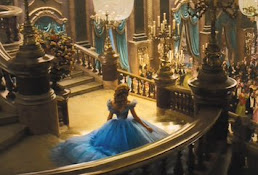 *Slight Spoilers*
*Slight Spoilers* I may simply have been relieved that I didn't have to watch mice sing. (I did love the pissed-off cat.)
Actually, the impressive thing about Branagh's Cinderella (Disney's version without songs) is the subtle way the script, the directing, and the actors/actresses insert psychology into a classic tale.
One of my favorite aspects of re-told fairytales is this filling-in-the-blanks effort. Why does Cinderella's father remarry? Why is the stepmother so horrible? Why does Cinderella put up with it all?

Historical knowledge answers a number of these questions. As numerous fairy tales analyses have pointed out, remarriage was a custom in the Middle Ages, specifically men remarrying since women were more likely to die in childbirth than from any other cause. Stepmothers were understandably more invested in their immediate offspring--although there were nice stepmothers as well.
A woman from Cinderella's class had limited options--if she was willing to endure massive social disapproval, she might become a laundress, wife of a shopkeeper, or prostitute. An upperclass woman of the nineteenth century could, as the Bronte sisters unhappily discovered, work as a governess. And a little later, circa Florence Nightingale, they could possibly work as nurses (with the burden of nobody treating them with a great deal of respect).
Cinderella truly has few options, not if she wants to eat.
Whoever wrote the script for Branagh's Cinderella was clearly well-versed in historical explanations (even if princes refusing to hunt down stags isn't a historical norm). The stepmother's partying as a member of the demimonde explains the lack of affection between husband and wife. The debt caused by the father's death (a merchant, his capital would reside in the next shipment) explains the lack of funds for servants.
However, for a modern audience, psychology also needs to be present, and the psychology in this case is very clever:
 |
| Cinderella's deep curtsy to the king isn't female |
| capitulation. It is savvy statesmanship. |
She doesn't. By putting the kingdom's needs first at the end of the movie, she acknowledges that she is not only tough enough to survive (and she knows it), she is savvy enough to correctly diagnose her stepmother's petty ambitions. And she'll make a fairly stellar queen since she has enough inherent pride to overrule others' weaker wills.
She's well-played by Lily James who combines sweetness with a stubborn chin.
2. Why is the stepmother so horrible?
 She's magnificently played by Cate Blanchett, who can invest even the flimsiest dialog with meaning. The quietly nasty way by which she slowly diminishes Ella's position in the household is chillingly effective.
She's magnificently played by Cate Blanchett, who can invest even the flimsiest dialog with meaning. The quietly nasty way by which she slowly diminishes Ella's position in the household is chillingly effective.In this case, the script provides more than flimsy dialog, giving the stepmother a monologue of degraded hopes. She's a desperate widow who wanted to get more out of life than life allowed her to get. This is Disney and she's a bad mom, so she suffers. I treated this type a little more kindly in Persuadable--with a little help from Austen. Austen didn't much care for this type either, but she understood it. If all that stands between a woman and poverty is an unhappy marriage . . .
Austen chose comparative poverty. She understood women who didn't.
 |
| Prince Kit confronting the conniving archduke. |
The psychology behind the shoe search (shoot, Kit knows what Cinderella looks like!) is extremely clever and totally unspoken. The prince pushes the trying-on-shoe thing, and it does initially seem like a massive waste of resources. But the overriding impression is that he is using the hunt to test the loyalty of his closest advisor. Weed out the bad apples!
And it works!!
 Still, I was left with the strong feeling that the marriage and the kingdom would survive because Cinderella is something of a financial and political powerhouse. And the prince is smart enough to recognize that fact.
Still, I was left with the strong feeling that the marriage and the kingdom would survive because Cinderella is something of a financial and political powerhouse. And the prince is smart enough to recognize that fact.As is the fairy godmother--another stellar performance by Helena Bonham Carter by the way.
All in all, a respectable well-told fairy tale.

No comments:
Post a Comment